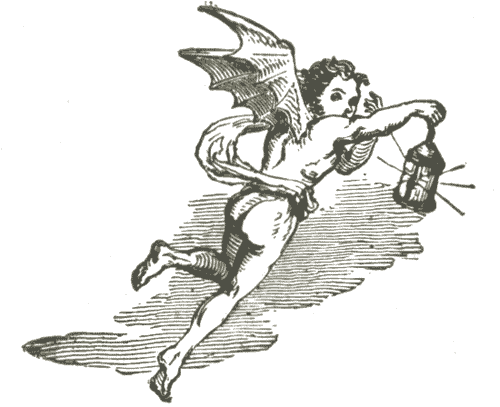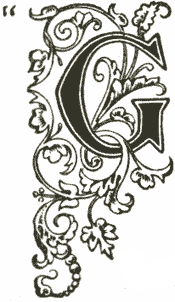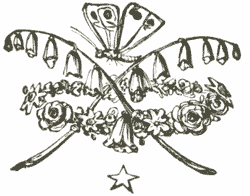The Headless Horseman - Fairy Legends of Ireland


OD speed you! and a safe journey this night to you, Charley," ejaculated the master of the little sheebeen house at Ballyhooley after his old friend and good customer, Charley Culnane, who at length had turned his face homewards, with the prospect of as dreary a ride and as dark a night as ever fell upon the Blackwater, along whose banks he was about to journey.
Charley Culnane knew the country well, and, moreover, was as bold a rider as any Mallow boy that ever rattled a four-year-old upon Drumrue racecourse. He had gone to Fermoy in the morning, as well for the purpose of purchasing some ingredients required for the Christmas dinner by his wife as to gratify his own vanity by having new reins fitted to his snaffle, in which he intended showing off the old mare at the approaching St. Stephen's Day hunt.
Charley did not get out of Fermoy until late; for although he was not one of your "nasty particular sort of fellows" in anything that related to the common occurrences of life, yet in all the appointments connected with hunting, riding, leaping—in short, in whatever was connected with the old mare—"Charley." the saddlers said, "was the devil to plase." An illustration of this fastidiousness was afforded by his going such a distance for a snaffle bridle. Mallow was full twelve miles nearer Charley's farm (which lay just three-quarters of a mile below Carrick) than Fermoy; but Charley had quarrelled with all the Mallow saddlers, from hard-working and hard-drinking Tim Clancey up to Mister Ryan, who wrote himself "Saddler to the Duhallow Hunt;" and no one could content him in all particulars but honest Michael Twomey of Fermoy, who used to assert—and who will doubt it?—that he could stitch a saddle better than the lord-lieutenant, although they made him all as one as king over Ireland.
This delay in the arrangement of the snaffle bridle did not allow Charley Culnane to pay so long a visit as he had at first intended to his old friend and gossip, Con Buckley of the "Harp of Erin." Con, however, knew the value of time, and insisted upon Charley making good use of what he had to spare. "I won't bother you waiting for water, Charley, because I think you'll have enough of that same before you get home; so drink off your liquor, man. It's as good parliament as ever a gentleman tasted, ay, and holy church too, for it will bear 'X waters,' and carry the bead after that, may be."
Charley, it must be confessed, nothing loth, drank success to Con, and success to the jolly "Harp of Erin," with its head of beauty and its strings of the hair of gold, and to their better acquaintance, and so on, from the bottom of his soul, until the bottom of the bottle reminded him that Carrick was at the bottom of the hill on the other side of Castletown Roche, and that he had got no further on his journey than his gossip's at Ballyhooley, close to the big gate of Convamore. Catching hold of his oil-skin hat, therefore, whilst Con Buckley went to the cupboard for another bottle of "the real stuff," he regularly, as it is termed, bolted from his friend's hospitality, darted to the stable, tightened his girths, and put the old mare into a canter towards home.
The road from Ballyhooley to Carrick follows pretty nearly the course of the Blackwater, occasionally diverging from the river and passing through rather wild scenery, when contrasted with the beauti-ful seats that adorn its banks. Charley cantered gaily, regardless of the rain which, as his friend Con had anticipated, fell in torrents: the good woman's currants and raisins were carefully packed between the folds of his yeomanry cloak, which Charley, who was proud of showing that he belonged to the "Royal Mallow Light Horse Volunteers," always strapped to the saddle before him, and took care never to destroy the military effect of it by putting it on. Away he went, singing like a thrush—
"Sporting, bellowing, dancing, drinking,
Breaking windows—(hiccup!)—sinking;
Ever raking—never thinking,
Live the rakes of Mallow.
Spending faster than it comes,
Beating—(hiccup, hic),—and duns,
Duhallow's true-begotten sons,
Live the rakes of Mallow."
Notwithstanding that the visit to the jolly "Harp of Erin" had a little increased the natural complacency of his mind, the drenching of the new snaffle reins began to disturb him; and then followed a train of more anxious thoughts than even were occasioned by the dreaded defeat of the pride of his long-anticipated turn out on St. Stephen's Day. In an hour of good fellowship, when his heart was warm, and his head not over cool, Charley had backed the old mare against Mr. Jepson's bay filly Desdemona for a neat hundred, and he now felt sore misgivings as to the prudence of the match. In a less gay tone he continued,—
"Living short, but merry lives,
Going where the devil drives,
Keeping——"
"Keeping," he muttered, as the old mare had reduced her canter to a trot at the bottom of Kilcummer Hill. Charley's eye fell on the old walls that belonged, in former times, to the Templars; but the silent gloom of the ruin was broken only by the heavy rain which splashed and pattered on the gravestones. He then looked up at the sky to see if there was, among the clouds, any hope for mercy on his new snaffle reins; and no sooner were his eyes lowered, than his attention was arrested by an object so extraordinary as almost led him to doubt the evidence of his senses. The head, apparently of a white horse, with short cropped ears, large open nostrils, and immense eyes, seemed rapidly to follow him. No connection with body, legs, or rider could possibly be traced—the head advanced—Charley's old mare, too, was moved at this unnatural sight, and, snorting violently, increased her trot up the hill. The head moved forward, and passed on; Charley pursuing it with astonished gaze and wondering, by what means, and for what purpose, this detached head thus proceeded through the air, did not perceive the corresponding body until he was suddenly startled by finding it close at his side. Charley turned to examine what was thus so sociably jogging on with him, when a most unexampled apparition presented himself to his view. A figure, whose height (judging as well as the obscurity of the night would permit him) he computed to be at least eight feet, was seated on the body and legs of a white horse full eighteen hands and a half high. In this measurement Charley could not be mistaken, for his own mare was exactly fifteen hands, and the body that thus jogged alongside he could at once determine, from his practice in horseflesh, was at least three hands and a half higher.
After the first feeling of astonishment, which found vent in the exclamation "I'm sold now for ever!" was over, the attention of Charley, he being a keen sportsman, was naturally directed to this extraordinary body, and having examined it with the eye of a connoisseur, he proceeded to reconnoitre the figure so unusually mounted, who had hitherto remained perfectly mute. Wishing to see whether his companion's silence proceeded from bad temper, want of conversational powers, or from a distaste to water, and the fear that the opening of his mouth might subject him to have it filled by the rain, which was then drifting in violent gusts against them, Charley endeavoured to catch a sight of his companion's face, in order to form an opinion on that point. But his vision failed in carrying him further than the top of the collar of the figure's coat, which was a scarlet single-breasted hunting frock, having a waist of a very old-fashioned cut reaching to the saddle, with two huge shining buttons at about a yard's distance behind. "I ought to see further than this, too," thought Charley, "although he is mounted on his high horse, like my cousin Darby, who was made barony constable last week, unless 'tis Con's whisky that has blinded me entirely." However, see further he could not, and after straining his eyes for a considerable time to no purpose, he exclaimed, with pure vexation, "By the big bridge of Mallow, it is no head at all he has!"
"Look again, Charley Culnane," said a hoarse voice, that seemed to proceed from under the right arm of the figure.
Charley did look again, and now in the proper place, for he clearly saw, under the aforesaid right arm, that head from which the voice had proceeded, and such a head no mortal ever saw before. It looked like a large cream cheese hung round with black puddings: no speck of colour enlivened the ashy paleness of the depressed features; the skin lay stretched over the unearthly surface, almost like the parchment head of a drum. Two fiery eyes of prodigious circumference, with a strange and irregular motion flashed like meteors upon Charley, and a huge mouth reached from either extremity of two ears, which peeped forth from under a profusion of matted locks of lustreless blackness. This head, which the figure had evidently hitherto concealed from Charley's eyes, now burst upon his view in all its hideousness. Charley, although a lad of proverbial courage in the county Cork, yet could not but feel his nerves a little shaken by this unexpected visit from the headless horseman, whom he considered this figure doubtless must be. The cropped-eared head of the gigantic horse moved steadily forward, always keeping from six to eight yards in advance. The horseman, unaided by whip or spur, and disdaining the use of stirrups, which dangled uselessly from the saddle, followed at a trot by Charley's side, his hideous head now lost behind the lappet of his coat, now starting forth in all its horror as the motion of the horse caused his arm to move to and fro. The ground shook under the weight of its supernatural burthen, and the water in the pools was agitated into waves as he trotted by them.
On they went—heads without bodies, and bodies without heads. The deadly silence of night was broken only by the fearful clattering of hoofs, and the distant sound of thunder, which rumbled above the mystic hill of Cecaune a Mona Finnea. Charley who was naturally a merry-hearted and rather a talkative fellow, had hitherto felt tongue-tied by apprehension, but finding his companion showed no evil disposition towards him, and having become somewhat more reconciled to the Patagonian dimensions of the horseman and his headless steed, he plucked up all his courage, and thus addressed the stranger,— "Why, then, your honour rides mighty well without the stirrups!"
"Humph!" growled the head from under the horseman's right arm. " 'Tis not an over-civil answer," thought Charley; "but no matter, he was taught in one of them riding-houses, may be, and thinks nothing at all about bumping his leather breeches at the rate of ten miles an hour. I'll try him on the other tack. Ahem!" said Charley, clearing his throat, and feeling at the same time rather daunted at this second attempt to establish a conversation. "Ahem! that's a mighty neat coat of your honour's, although 'tis a little too long in the waist for the present cut."
"Humph!" growled again the head.
This second humph was a terrible thump in the face to poor Charley, who was fairly bothered to know what subject he could start that would prove more agreeable. " 'Tis a sensible head," thought Charley, "although an ugly one, for 'tis plain enough the man does not like flattery." A third attempt, however, Charley was determined to make, and having failed in his observations as to the riding and coat of his fellow-traveller, thought he would just drop a trifling allusion to the wonderful headless horse that was jogging on so sociably beside his old mare; and as Charley was considered about Carrick to be very knowing in horses, besides being a full private in the Royal Mallow Light Horse Volunteers, which were every one of them mounted like real Hessians, he felt rather sanguine as to the result of his third attempt.
"To be sure, that's a brave horse your honour rides," recommenced the persevering Charley.
"You may say that, with your own ugly mouth," growled the head.
Charley, though not much flattered by the compliment, nevertheless chuckled at his success in obtaining an answer, and thus continued,—
"May be your honour wouldn't be after riding him across the country?"
"Will you try me, Charley?" said the head, with an inexpressible look of ghastly delight.
"Faith, and that's what I'd do," responded Charley, "only I'm afraid, the night being so dark, of laming the old mare, and I've every halfpenny of a hundred pounds on her heels."
This was true enough. Charley's courage was nothing dashed at the headless horseman's proposal; and there never was a steeple-chase, nor a fox-chase, riding or leaping in the country, that Charley Culnane was not at it, and foremost in it.
"Will you take my word," said the man who carried his head so snugly under his right arm, "for the safety of your mare?"
"Done," said Charley; and away they started, helter-skelter, over everything, ditch and wall, pop, pop; the old mare never went in such style, even in broad daylight; and Charley had just the start of his companion, when the hoarse voice called out, "Charley Culnane, Charley, man, stop for your life— stop!"
Charley pulled up hard. "Ay," said he, "you may beat me by the head, because it always goes so much before you; but if the bet was neck and neck, and that's the go between the old mare and Desdemona, I'd win it hollow!"
It appeared as if the stranger was well aware of what was passing in Charley's mind, for he suddenly broke out quite loquacious.
"Charley Culnane," says he, "you have a stout soul in you, and are every inch of you a good rider. I've tried you, and I ought to know; and that's the sort of man for my money. A hundred years it is since my horse and I broke our necks at the bottom of Kilcummer Hill, and ever since I have been trying to get a man that dared to ride with me, and never found one before. Keep, as you have always done, at the tail of the hounds, never baulk a ditch, nor turn away from a stone wall, and the headless horseman will never desert you nor the old mare."
Charley, in amazement, looked towards the stranger's right arm, for the purpose of seeing in his face whether or not he was in earnest, but behold! the head was snugly lodged in the huge pocket of the horseman's scarlet hunting-coat. The horse's head had ascended perpendicularly above them, and his extraordinary companion rising quickly after his avant courier, vanished from the astonished gaze of Charley Culnane.
Charley, as may be supposed, was lost in wonder, delight, and perplexity; the pelting rain, the wife's pudding, the new snaffle—even the match against squire Jepson—all were forgotten; nothing could he think of, nothing could he talk of, but the headless horseman. He told it, directly he got home, to Judy; he told it the following morning to all the neighbours; and he told it to the hunt on St. Stephen's Day; but what provoked him after all the pains he took in describing the head, the horse, and the man, was that one and all attributed the creation of the headless horseman to his friend Con Buckley's "X water parliament." This, however, should be told, that Charley's old mare beat Mr. Jepson's bay filly Desdemona by Diamond, and Charley pocketed his cool hundred; and if he didn't win by means of the headless horseman, I am sure I don't know any other reason for his doing so.

